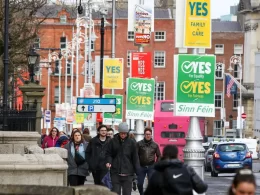By Jonathan Diebold
“Young workers in Ireland are financially worse off than their parents. Workers in their 20s are – in real terms – earning less than they did in the 1990s and 2000s.” These are the stark findings of the May 2021 ESRI report. Things have only gotten worse since then. How could this not be the case, when the government have again and again been in effect cutting the minimum wage – which impacts disproportionately on young people, and on any worker paid just above that wage?
Last year, when inflation was 5.5%, the government introduced a 2.9% increase in the minimum wage – a paltry 30 cent. This year, the minimum wage is due to rise by 80 cent – a 7.6% increase when inflation is already 9.1% and rising. This, in the midst of a cost-of-living crisis, when people are already struggling to afford food and rent.
Raise the wage
Micheál Martin told Socialist Party TD Mick Barry last week that “the vast majority on the minimum wage are not the main income earners in families.” In fact, nearly one in ten workers in Ireland are on the minimum wage, with 68% of minimum wage workers working full-time, and 90.5% in permanent positions. Nearly half of Ireland’s minimum wage workers have education beyond second level; Ireland has the highest qualified minimum wage workers in the EU. These are not casual workers hoping to earn a bit of extra cash. But even if this were the case, a minimum wage increase would be a boost to all low-paid workers, with wages rising in proportion to minimum wage increases.
Ireland has among the highest rates of low pay in the EU with nearly one-fifth in working in low-pay conditions (low pay is officially defined as pay which is two-thirds of the median rate, or €11.86 per hour in Ireland). Meanwhile, it is one of the most expensive countries in Europe. Ireland’s minimum wage is touted as being one of the highest nominally, but in fact, is far lower than other countries in terms of its actual purchasing power. Bringing the minimum wage to a real living wage would end this situation immediately.
€16 now!
When socialists demanded a €15 minimum wage, it was dismissed as impractical. Now, a massive increase in the minimum wage, at least to €16 per hour, is the only practical way to prevent tens of thousands of workers from freezing in their houses this winter or going hungry so they can feed their children. A sustained campaign of organising in workplaces and preparing for protests and strike action is necessary to achieve this and other cost of living measures.












